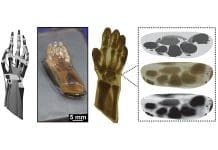Prof Dr Freimut Schliess, Director, Science & Innovation at Profil GmbH, sheds light on how Clinical Contract Research Organisations are building the digital bridge connecting clinical research and clinical care
Digitalisation is a mega-trend impacting almost all spheres of life and work. In the healthcare sector, the sensor-based acquisition of health & behavioural data and the derivation of digital biomarkers as by pattern recognition and artificial intelligence (AI) tools is expected to revolutionise both clinical research and clinical care.
Health solutions driven by the exploitation of continuously captured person-generated health and behavioural data will improve the outcomes of both clinical research and clinical care. On the other hand, we see a lack-of-data problem, that is, limited availability and usability of person-generated real-world data.
In clinical drug development, the lack of real-world data accounts for a low predictive value of controlled clinical trials. This contributes to high attrition rates with a 50% failure of drug candidates even in phase III. What is even worse for patients and drug developers, more than 450 drugs were required to be withdrawn from the markets between the 1950s and 2013. In clinical care, a lack of real-world data usage contributes to the gap between the efficacy of investigational drugs and devices in well-controlled clinical trials and the effectiveness of marketed products in real-life.
Clinical contract research for cost-effectiveness in drug development & chronic care
Clinical Contract Research Organisations (CROs) such as Profil have the capabilities to play a key role in improving cost-effectiveness in the healthcare sector. Based on Profil’s experience with initiatives on the implementation of digital solutions in diabetes care like CLOSE(1), iPDM-GO(2), D4Kids(3) and AP@home(4), we agree with drug developers and regulatory authorities in seeing a high need for integrating the acquisition of real-world data already in early phase clinical trials. Real-world data are accessible through the usage of medical-grade sensor systems which are fit-for-purpose and validated in the specific context-of-use. By measuring multiple parameters sensors should cover diverse domains of both drug safety and treatment-effect-modifiers. The early integration of real-world information will improve the quality of the sponsor’s decision-making on the (dis)continuation of clinical development programmes, thereby reducing failures in drug development with corresponding cost savings in the order of billions of euros.
Clinical CROs have the ambition of making a significant impact on the real-world effectiveness of treatments. One approach followed by Profil is to explore synergies from convergent trends in clinical research and clinical care by being part of innovation eco-systems provided by public-private partnerships such as EIT Health(5) and the Center of Competence for Innovative Diabetes Therapy.(6) Indeed, the diverse but complementary innovation initiatives curated by such partnerships integrate health industries, regional healthcare provision, data sciences and health economy, thereby create excellent ecosystems for jointly advancing the effectiveness of chronic disease management in a socially responsible manner.
CRO service enrichment brings the real world to clinical trials
Taking the need for adding real-world experience to the well-controlled trials clinical CROs are increasingly going to enrich their data management and statistic offers by creating a full portfolio of real-world data acquisition and exploitation services. Service provision starts with a scientific, regulatory & legal consulting on real-world data acquisition and exploitation. It continues with a rational design of the real-world trial component, the corresponding enrichment of the data management and statistics plan, the selection and validation of appropriate sensor systems, the education of trial participants, and the operational implementation of real-world data acquisition including a remote monitoring of trial participants. Services culminate in the derivation and consolidated interpretation of digital biomarker signatures as documented in a real-world drug safety and efficiency dossier. In agreement with sponsors, well reputed CROs can disseminate the real-world trial outcomes to the diverse stakeholder audiences including scientific and user communities and regulatory authorities.
It goes without saying that CROs like Profil have the capabilities to deliver services around real-world data in full compliance with the requirements imposed by law (e.g. the General Data Protection Regulation in Europe and the Health Insurance Portability and Accountability Act in the United States) and by regulatory authorities like FDA and EMA. This requires full transparency in the documentation of source data and audit trails, quality assurance and data filtering. Pattern recognition tools or AI-based algorithms used for the derivation of digital biomarkers on real-world drug safety and effectiveness need to be transparently disclosed.
The inspiration for clinical care from clinical contract research
Real-world clinical care can get inspiration from the collaboration with clinical CROs. The application of sensor-based technologies in the framework of professional clinical trial conduct may provide an ethical and operational blueprint for the exploitation of patient-generated data in clinical care. Clinical contract research has particularly high ethical standards when it comes to data management and statistical analysis, as well as data reporting and interpretation.
In order to inform the discussion with payers and medical associations, developers of real-world data acquisition and exploitation tools are well advised to initially go for the drug development market. Drug development could serve as a steppingstone to the much more complex outpatient and hospital care markets. Learning experiences and evidence for the benefit of using digital biomarkers in clinical drug development will inform the discussions with medical associations, health technology assessment bodies and payers. By performing independent trials clinical CROs contribute to the social acceptance of digital health solutions for clinical care, sharpen their competitive edge and prove their eligibility for reimbursement.
Last but by no means least, the elements of the pay-for-performance culture widely established in clinical contract research could serve as a model for corresponding remuneration schemes in clinical care.
References
1 Schliess, F. et al., J. Diabetes Sci. Technol. 13(2):261-267, 2019.
2 https://www.eithealth.eu/en_US/ipdm-go
3 https://www.eithealth.eu/diabeloop-for-children
4 Heinemann, L. et al., J. Diabetes Sci. Technol. 13(2):261-267, 2016
Please note: This is a commercial profile
Prof Dr Freimut Schliess
Director, Science & Innovation
Profil GmbH
Tel: +49 2131 4018 225











